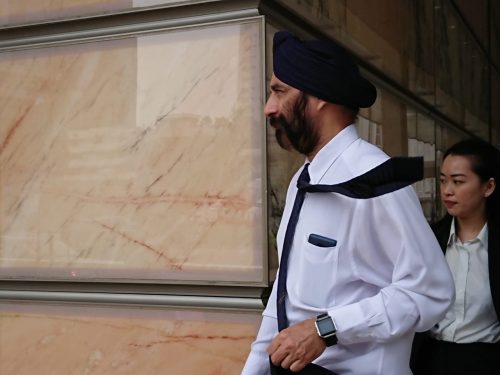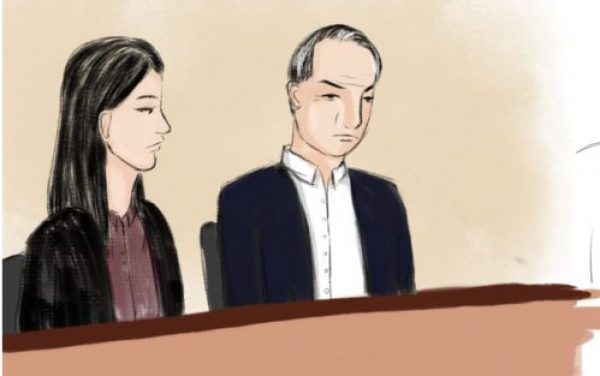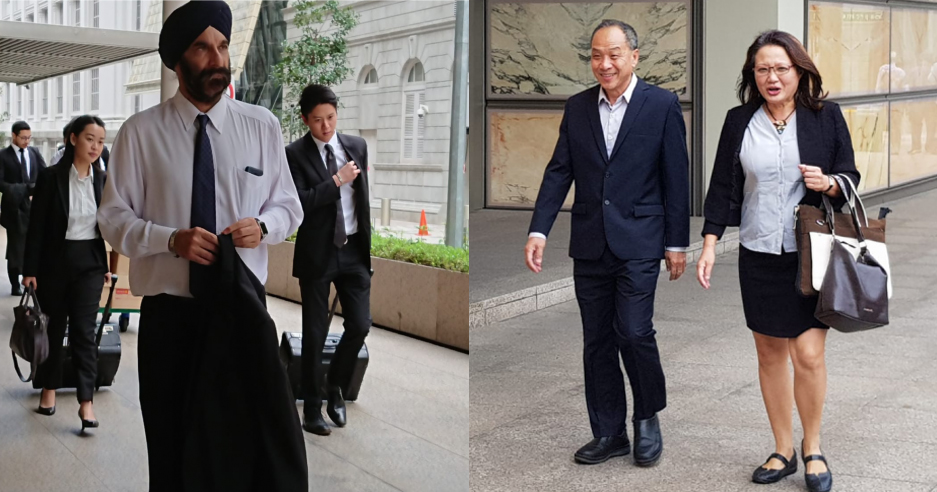Instead of acting in good faith and behaving as a responsible custodian of public monies following GE2011, Low Thia Khiang, former Secretary-General of the Workers' Party (WP), had a plan, the plaintiff's lawyer charged.
The plan was for the company set up by his supporters, How Weng Fan and her late husband Danny Loh, to take over as managing agent of Aljunied-Hougang Town Council (AHTC) from the existing contractor, CPG Facilities Management.
This was argued by Senior Counsel Davinder Singh, who said during his cross-examination of Low on Oct. 16:
"I suggest to you sir, that on the Monday morning after the elections, you had decided to get rid of CPG and to appoint a company in which Ms How would be involved as the MA of the (town council)."
Low responded:
"That's not true."
Davinder Singh for the plaintiff
It was the eighth day of the trial, but it was the first time that a senior WP figure had been cross-examined by Davinder, who is representing the plaintiff, Pasir Ris-Punggol Town Council (PRPTC).
From 2013 to 2015, Punggol East was managed by the combined Aljunied-Hougang-Punggol East Town Council (AHPETC).
PRPTC is currently managing Punggol East ward. It is suing several defendants for allegedly breaching their fiduciary duties to AHTC.
These defendants include WP MPs Low, Sylvia Lim, Pritam Singh, How and the FM Solutions & Services company, of which How is a majority owner.
Plan in mind
Davinder took the court back to the general election of 2011, where the WP won Aljunied GRC from the PAP on May 7.
He referred to an email sent by Low to his fellow MPs-elect on Monday, May 9, the first working day after the election.
How, who was the Secretary for Hougang Town Council at the time, was copied in this email.
The email mentioned a discussion that took place earlier that Monday. How was not present for the discussion at that time.
However, Davinder pointed out a paragraph in the email that read:
"I have also communicated to Ms How our decision that Hougang Town Council will be merged with Aljunied Town Council. We will appoint (a) Managing Agent to manage the town instead of self-management."
Davinder said that instead of first performing due diligence or conducting checks, Low had already decided, along with his fellow elected MPs, to change the Managing Agent (MA) of the town council.
Davinder added:
"This was the first working meeting after the euphoria of the elections... you had decided to axe CPG."
No plan, just a contingency
Low refuted this, and said that the meeting of May 9 was to discuss a contingency plan.
He said that no decision had been taken at the time to replace CPG.
Instead, he was responding to feedback from the ground that CPG had become less "active" and responsive when dealing with the town council.
Low said that he first knew that CPG intended not to continue working with the town council during a meeting he had with them on May 30.
 Pic by Guan Zhen Tan.
Pic by Guan Zhen Tan.
Incorporation of FMSS
Davinder referred to an application made by Loh on May 12 to Accounting and Corporate Regulatory Authority (Acra) to apply for a new company name, FMSS.
This, according to Davinder, logically meant that the decision to set up FMSS was made before May 12.
Low agreed, saying that he asked How to help the WP by forming a facilities management company before May 12.
However, Low said that he did not know the exact timeline of FMSS's incorporation.
Davinder said it appeared that following the May 9 meeting, to implement what was discussed, How was told to incorporate FMSS.
As his defence, Low claimed that this was just a contingency plan, which stemmed from a genuine concern of a managing agent pull-out following an opposition victory of securing a GRC.
Davinder asked if any of Low's fellow MPs replied to ask or confirmed that they had discussed a contingency plan.
The lawyer also asked if anyone had pointed out that due diligence needed to be done first.
In reply, Low said there was no email reply. In response to the question of due diligence, he said:
"No, I don't think so."
Not telling CPG
Davinder said that if a decision was made to appoint someone else to replace CPG, then CPG would have to be informed.
He asked Low if he had done so.
Low said that he did not inform CPG, but denied that he had already decided to replace CPG prior to their meeting on May 30.
Low said:
"Why should I tell them? It’s not a matter of replacement. They wanted out."
Low also said:
"They wanted out, they asked for a mutual release, we released them. And we appointed a new MA."
In response, Davinder said:
"So you didn't tell CPG, that much we agree."
 Low with am interpreter. Illustration by Guan Zhen Tan.
Low with am interpreter. Illustration by Guan Zhen Tan.
Low did not check CPG's contract
Another major point of contention that emerged was Low’s admission that he had not read the contract with CPG and that he was unsure if anyone else had done so by June 2011, after CPG had expressed its desire to pull out during the May 30 meeting.
On top of that, Loh had also not accounted for the cost structure of CPG.
Davinder suggested that Low had not done so because a plan had already been made.
In response, Low asked if there was anything more to negotiate with CPG since they had already stated their intention at the May 30 meeting of discontinuing their services.
This led to Davinder’s reply that a “responsible town councillor” would have checked the contract before releasing the other party.
The town council also had legal means at their disposal in the event contracts were not honoured, Davinder put forth to Low.
Davinder then elaborated on his suggestion of a plan by Low, stating that this was because the failure to read the contract gave the former WP chief an opportunity for FMSS to come in once CPG had pulled out -- a pertinent move since FMSS was comprised of WP supporters.
Davinder further added that in doing so, Low had “put (his) political supporters ahead of (his) residents’ interests”.
To this, Low replied that it was not true as “uppermost” on his mind was the issue of how to protect the residents’ interests.
Low also said any transition made after CPG was to put residents' interest first.
Why set up FMSS in the first place?
Davinder also questioned Low’s decision to have How and her late husband, Loh, set up FMSS, instead of hiring How directly as an employee of the town council.
Davinder noted that How had already been doing a good job for Low as Secretary of Hougang Town Council, and questioned why Low did not just simply hire How as the secretary for AHTC.
She could also expand the staff accordingly, if needed, he said.
To this, Low quoted from his affidavit. Pointing out how directly managing the town council as an MP was risky, Loh stated that it was also not a very cost-effective approach.
Moreover, direct management imposed additional strains on manpower and the MPs which would prevent them from carrying out their duties at the grassroots and parliamentary level properly.
Alleged element of profit
In response, Davinder said that as per Low’s own affidavit, both How and Loh were initially reluctant to establish a new company as the couple was contemplating semi-retirement.
Davinder then continued by highlighting how the act of setting up a new company would have required the town council to pay the company’s charges had it been engaged, including the salaries of How and her staff, along with the introduction of a “profit element” for How and the company’s shareholders.
Davinder said that Low introduced a “profit element” via the setting up of a new company in order to induce How to take up the job.
In response, Low stated that this was because the Aljunied town council was unsure if CPG wanted to continue.
Following up on that, Davinder buttressed his suggestion that Low “wanted CPG out” and was “playing with monies that didn’t belong to you (Low).”
Low replied:
“Your honour, I reject these allegations.”
Davinder added that on the basis of Low’s emails and letter sent out on May 9 and 13, and the fact that he did not check CPG’s cost structure, another of Low’s reasons was the establishment of a start-up for the benefit of opposition town councils, should there be more of them winning future elections.
Low’s response was that such a reason would have been a positive outcome and a consequence instead of something planned for.
Low's cross-examination is expected to continue on Oct. 17.
[related_story]
Top image by Guan Zhen Tan and Matthias Ang
If you like what you read, follow us on Facebook, Instagram, Twitter and Telegram to get the latest updates.
